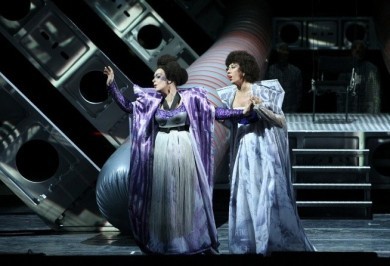Production by La Fura dels Baus
Co-production with the Palau de les Arts Reina Sofia (Valencia) and Poland's Opera Narodowa
Epic opera duologue
Libretto by the composer after motifs from Virgil's Aeneid
Interview with Carlus Padrissa (Stage director)
Les Troyens is an absolutely immense opera. How do you plan to retain the audience's attention for such a long time?
Les Troyens lasts over five hours. The score and the libretto for the opera are amazingly interesting. In the first part, we learn of the terrible story of a civilisation's self-destruction, and in the second there is a description of people resting in a foreign land, while in the third they resolve to set out and discover a place where they can build their world afresh. I think that the opera is a space where the concept of time disappears if the production is able to touch the depths of our souls. It is something that we are duty bound to attempt to do.
Do you see parallels in the plot of Les Troyens with the problems of life today?
A great many. In our version, the Trojans are viruses that get to the heart of an operating system, destroying all the information stored there. That is the description of the Trojan virus that can be found in every search engine on the Internet. According to the concept for the production, a "Trojan virus" is being carried by the characters themselves, and its effect can lead to disastrous consequences. In the second part of the production the heroes, who have suffered amnesia because of the virus, are regaining their health in Carthage, a world of pleasures. It is a true sensual paradise with the sea, the beach, the palm trees as well as a strong and emergent power that is carrying out an environmental study. It is, moreover, a society where well organised groups and professional unions serve public wellbeing. But, ultimately, despite the hospitality of the people of Carthage, the protagonists once again set out on a journey. They take their places in a spacecraft in order to set out for the distant planet of Mars and build a new civilisation there.
What does Berlioz' work mean for you, in particular his opera music?
Berlioz' music comes from a very rich cultural tradition. The opera Les Troyens is not staged so very often, despite all its rich content. I like the opera's choral scenes, its orchestration, the unexpected contrasts that create a "zapping" effect ("zapping" – switching from one channel to another using a remote control). The music in the opera is enchanting. The contrast between the sung choruses and arias and the declamatory recitatives that are accompanied by expressive orchestral counterpoint build truly tense musical and dramatic action.
Does your experience in cinematography help you at all in your work on operas? Will you be using any cinematographic techniques in the production?
The concept "cinematographer" appeared over one hundred years ago, and, ever since, many talented directors have left opera for cinema. Instead of new opera houses, cinemas were opened. But today we understand that cinema, however interesting it is, will always be a "copy" of a theatre production. It does not have all the same possibilities of interacting with the public, while an opera is a live performance that changes every day depending on the inspiration and the mood of the public.
Using cinematographic techniques and video installations in opera, we can bring it closer to other forms of modern art, such as "performance". The time is already here for a union between cinema and opera, and this union brings with it many new possibilities. One of the most impressive results to be found on this path can be seen in the virtual scenes of light in the production of Der Ring des Nibelungen at the Palau de les Arts in Valencia.
 Mariinsky Theatre:
Mariinsky Theatre:  Mariinsky-2 (New Theatre):
Mariinsky-2 (New Theatre):  Mariinsky Concert Hall:
Mariinsky Concert Hall: 

